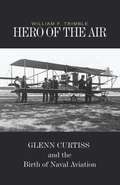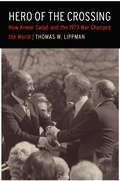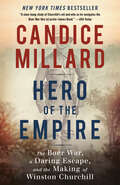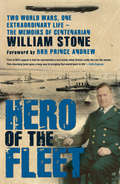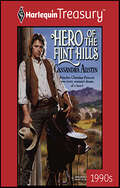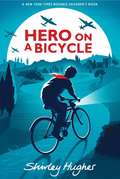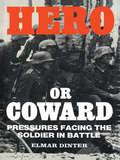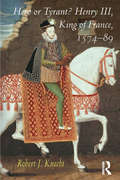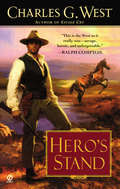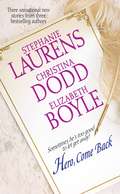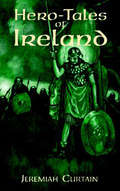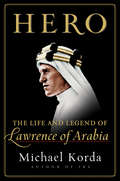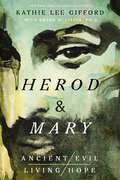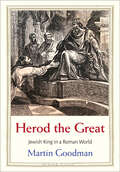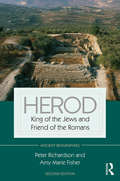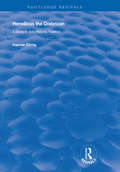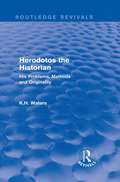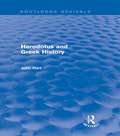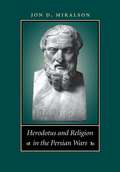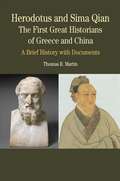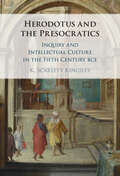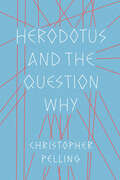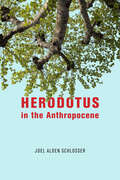- Table View
- List View
Hero of the Air
by William F. TrimbleIn this biography, William F. Trimble examines the pioneering work of Glenn Curtiss and his role in the originsof aviation in the U.S. Navy in the years up to and through World War I. A self-taught mechanic and inventor, Curtiss was a key figure in the development of the airplane during the early part of the century and his contributions to aviation are well known. This book s careful examination of his partnership with the Navy breaks new ground in revealing significant new details of his contributions. Curtiss s links to the Navy came as result of aviation advocates within the Navy, chief among them Captain Washington I. Chambers, who recognized that the Navy had special requirements for airplanes and their operations, and for aviators and their training. Curtiss helped meet the special requirements of the service for aircraft, particularly those with the potential for operating with naval vessels at sea or in conducting long-distance flights over water. He also was instrumental in training the first naval aviators. Curtiss and the Navy continued their collaboration through World War I, reaching a climax in 1919 with the first transatlantic flight of the famed Navy-Curtiss NC flying boat.This book addresses the broader implications of the Curtiss-Navy collaboration in the context of the longstandingtrend of government-private cooperation in the introduction and development of new technologies. It also explores the interactive dynamics of weapons procurement and technological change within a large and entrenched bureaucracy and helps lay to rest the persistent myth that the Navy resisted the introduction of aviation
Hero of the Crossing: How Anwar Sadat and the 1973 War Changed the World
by Thomas W. LippmanIn eleven dramatic years, Anwar Sadat changed history—not just that of Egypt, or of the Middle East, but of the entire world. As the architect of the 1973 war against Israel, he gained the support of other Arab nations and inspired the oil embargo that transformed the global economy. Following the war, however, he forever ended Arab aspirations of unity by making peace with Israel. Early in his presidency, Sadat jettisoned Egypt’s alliance with the Soviet Union and turned to the United States, thereby giving the West a crucial Cold War victory. Sadat’s historic tenure still resonates in the twenty-first century as the Islamic activists—whom he originally encouraged but who opposed his conciliatory policy toward Israel and ultimately played a role in his assassination—continue to foster activism, including the Muslim Brotherhood, today.Thomas W. Lippman was stationed in the Middle East as a journalist during Sadat’s presidency and lived in Egypt in the aftermath of the October War. He knew Sadat personally, but only now, after the passage of time and the long-delayed release of the U.S. State Department’s diplomatic files, can Lippman assess the full consequences of Sadat’s presidency. Hero of the Crossing provides an eye-opening account of the profound reverberations of one leader’s political, cultural, and economic maneuverings and legacy.
Hero of the Empire: The Boer War, a Daring Escape, and the Making of Winston Churchill
by Candice MillardFrom the bestselling author of Destiny of the Republic, this thrilling biographical account of the life and legacy of Wintson Churchill is a "nail-biter and top-notch character study rolled into one" (The New York Times). At the age of twenty-four, Winston Churchill was utterly convinced it was his destiny to become prime minister of England. He arrived in South Africa in 1899, valet and crates of vintage wine in tow, to cover the brutal colonial war the British were fighting with Boer rebels and jumpstart his political career. But just two weeks later, Churchill was taken prisoner. Remarkably, he pulled off a daring escape—traversing hundreds of miles of enemy territory, alone, with nothing but a crumpled wad of cash, four slabs of chocolate, and his wits to guide him.Bestselling author Candice Millard spins an epic story of bravery, savagery, and chance encounters with a cast of historical characters—including Rudyard Kipling, Lord Kitchener, and Mohandas Gandhi—with whom Churchill would later share the world stage. But Hero of the Empire is more than an extraordinary adventure story, for the lessons Churchill took from the Boer War would profoundly affect twentieth century history.Look for Candice Millard&’s latest book, River of the Gods.
Hero of the Fleet: Two World Wars, One Extraordinary Life - The Memoirs of Centenarian William Stone
by William StoneWilliam Stone died on 10 January 2009 aged 108. He received a hero's funeral. Born in rural Devon, he joined the navy during the First World War, travelled the globe just before the British Empire's light began to fade and saw action in some of the most significant sea battles of the Second World War. Afterwards, he returned to Devon to run a barber's shop, an altogether more peaceable existence.As time passed, he became one of a dwindling number of men still alive who had served in the Great War. This meant that for some of the most momentous anniversaries clocked up recently - including the 90th anniversary of the end of the First World War - William was a guest of honour. This autobiography bridges two wars and encompasses the remarkable episodes and adventures. It was an ordinary life lived in extraordinary times. He died at a time when the navy is attempting to embrace new ships that bear scant resemblance to those that William knew and face the challenges of a world that shrinks with every bold technological advance. His was a different kind of boldness. This is his astonishing story.
Hero of the Flint Hills
by Cassandra AustinHe Hadn't Wanted to Like A City Girl-Much Less Love One,but Christian Prescott found himself on the horns of a dilemma: his yearning for Lynnette Sterling, his brother's intended bride. But she had corralled his heart and spurred him to a decision that would change his life forever...!Lynnette's eyes were finally opened when she met her future brother-in-law. For she knew in a prairie heartbeat that Christian Prescott was the embodiment of the rugged West-and the unattainable realization of her every dream of love!
Hero on a Bicycle
by Shirley HughesItaly, 1944: Florence is occupied by Nazi forces. The Italian resistance movement has not given up hope, though -- and neither have thirteen-year- old Paolo and his sister, Costanza. As their mother is pressured into harboring escaping POWs, Paolo and Costanza each find a part to play in opposing the German forces. Both are desperate to fight the occupation, but what can two siblings -- with only a bicycle to help them -- do against a whole army? Middle-grade fans of history and adventure will be riveted by the action and the vividly evoked tension of World War II.
Hero or Coward: Pressures Facing the Soldier in Battle
by Elmar DinterElmar Dinter addresses the question of why some men fight well in war and others do not. He examines the factors and draws conclusions involving recommendations for new methods of personnel selection and new tactics, training and military education.
Hero or Tyrant? Henry III, King of France, 1574-89
by Robert J. KnechtKing Henry III of France has not suffered well at the hands of posterity. Generally depicted as at best a self-indulgent, ineffectual ruler, and at worst a debauched tyrant responsible for a series of catastrophic political blunders, his reputation has long been a poor one. Yet recent scholarship has begun to question the validity of this judgment and look for a more rounded assessment of the man and his reign. For, as this new biography of Henry demonstrates, there is far more to this fascinating monarch than the pantomime villain depicted by previous generations of historians and novelists. Based upon a rich and diverse range of primary sources, this book traces Henry’s life from his birth in 1551, the sixth child of Henri II and Catherine de’ Medici. It following his upbringing as the Wars of Religion began to tear France apart, his election as king of Poland in 1573, and his assumption of the French crown a year later following the death of his brother Charles IX. The first English-language biography of Henry for over 150 years, this study thoroughly and dispassionately reassesses his life in light of recent scholarship and in the context of broader European diplomatic, political and religious history. In so doing the book not only provides a more nuanced portrait of the monarch himself, but also helps us better understand the history of France during this traumatic time.
Hero's Stand
by Charles G. WestAction-packed western adventure from the author of Crow Creek Crossing. MILITIA MADNESS Up in the Montana mountains, Canyon Creek is the perfect little town for Simon Fry and his men to hole up for the winter. The folks are friendly enough to open their homes to eight perfect strangers--and gullible enough to believe that Fry's gang is a militia sent to protect them from hostile Indians. Jim Culver is new in town, but he knows something isn't right about Simon Fry's "militia." They seem more interested in intimidating people than helping them. Anyone who questions them ends up dead or driven out. Someone has to step forward to protect the people of Canyon Creek from their new "protectors." That someone is Jim Culver. And this sleepy town is about to wake up with a bang.
Hero, Come Back
by Elizabeth Boyle Stephanie Laurens Christina DoddTwo superstar New York Times bestsellers, Stephanie Laurens and Christina Dodd, join forces with one exciting rising star, Elizabeth Boyle, to create this sexy anthology with an exciting new theme. In an innovative new twist for anthologies, each author is reintroducing a secondary character from a previous book to star in his own story!
Hero-Tales of Ireland (Celtic, Irish Ser.)
by Jeremiah CurtinOnce upon a time all of the legends of Fin MacCool, an ancient hero of Gaelic mythology, were written down for posterity. Saint Patrick, however, was obliged to order two-thirds of them destroyed. The tales were so entertaining, said he, that the people of Erin would do nothing but listen to them. Fortunately for us, many Fenian tales survive, as this captivating collection features 24 tales of super-human heroes and their adventures.Compiled by an ethnographer from the Smithsonian Institution who traveled Ireland in the late nineteenth century in search of these vanishing folk tales, this volume abounds with fantastic accounts of bold warriors who battle dragons and giants, outwit sorcerers, and with the help of loyal comrades, overcome death itself. This delightful collection represents not only a valuable resource for students of anthropology and aficionados of Celtic lore but also hours of enchanting reading for lovers of folk tales.
Hero: The Life and Legend of Lawrence of Arabia
by Michael KordaMichael Korda's Hero is the story of an epic life on a grand scale: a revealing, in-depth, and gripping biography of the extraordinary, mysterious, and dynamic Englishman whose daring exploits and romantic profile--including his blond, sun-burnished good looks and flowing white robes--made him an object of intense fascination, still famous the world over as "Lawrence of Arabia." An Oxford scholar and archaeologist, one of five illegitimate sons of a British aristocrat who ran away with his daughters' governess, Lawrence was sent to Cairo as a young intelligence officer in 1916. He vanished into the desert in 1917 only to emerge later as one of the greatest-and certainly most colorful-figures of World War One. Though a foreigner, he played a leading and courageous part in uniting the Arab tribes to defeat the Turks, and eventually capture Damascus, transforming himself into a world-famous hero, hailed as "the Uncrowned King of Arabia." In illuminating Lawrence's achievements, Korda digs further than anyone before him to expose the flesh-and-blood man and his contradictory nature. Here was a born leader who was utterly fearless and seemingly impervious to pain, thirst, fatigue, and danger, yet who remained shy, sensitive, mod-est, and retiring; a hero who turned down every honor and decoration offered to him, and was racked by moral guilt and doubt; a scholar and an aesthete who was also a bold and ruthless warrior; a writer of genius-the author of Seven Pillars of Wisdom, one of the greatest books ever written about war-who was the virtual inventor of modern insurgency and guerrilla warfare; a man who at the same time sought and fled the limelight, and who found in friendships, with everyone from Winston Churchill to George Bernard and Charlotte Shaw, from Nancy Astor to NoËl Coward, a substitute for sexual feelings that he rigorously-even brutally and systematically-repressed in himself. As Korda shows in his brilliantly readable and formidably authoritative biography, Lawrence was not only a man of his times; he was a visionary whose accomplishments-farsighted diplomat and kingmaker, military strategist of genius, perhaps the first modern "media celebrity" (and one of the first victims of it), and an acclaimed writer-transcended his era. Korda examines Lawrence's vision for the modern Middle East-plans that, had they been carried through, might have prevented the hatred and bloodshed that have become ubiquitous in the region. Ultimately, as this magisterial work demonstrates, Lawrence remains one of the most unique and fascinating figures of modern times, the arch-hero whose life is at once a triumph and a sacrifice and whose capacity to astonish still remains undimmed.
Herod and Mary: The True Story of the Tyrant King and the Mother of the Risen Savior (Ancient Evil, Living Hope #1)
by Kathie Lee GiffordExplore the interwoven lives of King Herod and Mary, Mother of Jesus as New York Times bestselling author Kathie Lee Gifford brings these biblical figures into a new light. Follow Herod from boyhood as he strives and fails throughout his life to become a beloved king. Walk in the steps of Mary of Nazareth as she navigates the repercussions of Herod's deadly obsession.Delve into the complex history of Herod the Great—his rise to power and ultimate fall in pursuit to be the "King of the Jews." Under a flourishing yet tumultuous background of Jerusalem, consider Mary of Nazareth's place under Herod's rule and the promise of a Messiah to free her people. Kathie Lee Gifford with Bryan M. Litfin, Ph.D. deftly weave a truthful historical narrative full of accurate details and sweeping prose that ushers in the true King and glorifies God's powerful plan to bring a savior into the world through unlikely means. A coda between the authors, full of honest revelation and insightful meaning, follows each chapter for added in-depth reading.The first installment in the Ancient Evil, Living Hope series, Herod and Mary begins with the tragic life of King Herod—Christianity's first true persecutor. As an impressionable boy, he is forever marked by the raw power of Rome. Throughout the course of Herod's career, he gains power, fame, and riches beyond belief. Yet murderous intrigues stalk this man—and infect his own dark soul.Under the rule of King Herod, Jerusalem becomes a prominent city of wealth and prosperity, but Mary saw the struggle of her people under a tyrant. Like all Jewish women, she knew the promises of Torah and longed for a deliverer. But no one could have prepared her for what the angel of God revealed: that the Messiah wouldn't arrive with the blaring of trumpets, the clash of arms, or the fanfare of a mighty host. He would arrive as an infant within her own womb. The light of the world was born in a cave: not a king who maims and destroys, but the gentle King of the Jews.This riveting narrative nonfiction work reveals deep insight to how Herod came to power, how corruption and an ancient evil threatened the stability of a nation, and how a teenage Mary was called to traverse these obstacles to bring the Savior, Jesus, our living hope, into the world.
Herod the Great: Jewish King in a Roman World (Jewish Lives)
by Martin GoodmanA vivid account of the political triumphs and domestic tragedies of the Jewish king Herod the Great during the turmoil of the Roman revolution &“Herod the Great is typical of Yale&’s Jewish Lives series: short, clear, deeply knowledgeable, deeply illuminating.&”—Dominic Green, Wall Street Journal Herod the Great (73–4 BCE) was a phenomenally energetic ruler who took advantage of the chaos of the Roman revolution to establish himself as a major figure in a changing Roman world and transform the landscape of Judaea. Both Jews and Christians developed myths about his cruelty and rashness: in Christian tradition he was cast as the tyrant who ordered the Massacre of the Innocents; in the Talmud, despite fond memories of his glorious Temple in Jerusalem, he was recalled as a persecutor of rabbis. The life of Herod is better documented than that of any other Jew from antiquity, and Martin Goodman examines the extensive literary and archaeological evidence to provide a vivid portrait of Herod in his sociopolitical context: his Idumaean origins, his installation by Rome as king of Judaea and cultivation of leading Romans, his massive architectural projects, and his presentation of himself as a Jew, most strikingly through the rebuilding of the Jerusalem Temple. Goodman argues that later stories depicting Herod as a monster derived from public interest in his execution of three of his sons after dramatic public trials foisted on him by a dynastic policy imposed by the Roman emperor.
Herod: King of the Jews and Friend of the Romans (Routledge Ancient Biographies)
by Peter Richardson Amy Marie FisherHerod: King of the Jews and Friend of the Romans examines the life, work, and influence of this controversial figure, who remains the most highly visible of the Roman client kings under Augustus. Herod’s rule shaped the world in which Christianity arose and his influence can still be seen today. In this expanded second edition, additions to the original text include discussion of the archaeological evidence of Herod’s activity, his building program, numismatic evidence, and consideration of the roles and activities of other client kings in relation to Herod. This volume includes new maps and numerous photographs, and these coupled with the new additions to the text make this a valuable tool for those interested in the wider Roman world of the late first century BCE at both under- and postgraduate levels. Herod remains the definitive study of the life and activities of the king known traditionally as Herod the Great.
Herodicus the Cratetean: A Study in Anti-Platonic Tradition (Routledge Revivals)
by Ingemar DuringOriginally published in 1941. Herodicus was a Greek physician of the fifth century BC, and a native of Selymbria. The first use of therapeutic exercise for the treatment of disease and maintenance of health is credited to him, and he is believed to have been one of the tutors of Hippocates.
Herodotos the Historian: His Problems, Methods and Originality (Routledge Revivals)
by K. H. WatersThe work of Herodotos of Halikarnassos, ‘the father of history’, differs in many ways from that of modern historians, and it poses special problems to the student. Herodotos’ history of the Persian Wars, written in the second half of the fifth century BC, was both the first attempt at a comprehensive history and the first lengthy prose narrative in the Western cultural tradition. There was an almost total lack of written historical evidence in Greece at the time, and the audiences who paid to hear Herodotos’ lectures also expected historical dramatizations, and enjoyed descriptive material and anecdotes that today would be relegated to notes. In Herodotus the Historian, first published in 1985, K.H. Waters offers a comprehensive introduction to Herodotus’ background, aims, and methods. In a lively, informative style, this work offers a level-headed approach to an historian who has excited some extreme reactions and incited controversy among modern readers.
Herodotus Histories
by Simon HornblowerOne of the most important works of history in Western literature, by the freshest and liveliest of all classical Greek prose authors, Herodotus's Histories is also a key text for the study of ancient Greece and the Persian Empire. Covering a central and widely studied period of Greek history, Book V not only describes the revolt of the east Greeks against their Persian masters, which led to the great Persian Wars of 490–479 BC, but also provides fascinating material about the mainland Greek states in the sixth century BC. This is an up-to-date edition of and commentary on the Greek text of the book, providing extensive help with the Greek, basic historical information and clear maps, as well as lucid and insightful historical and literary interpretation of the text. The volume is suitable for advanced undergraduates, graduate students, teachers and scholars.
Herodotus and Greek History (Routledge Revivals)
by John HartHerodotus has shaped our knowledge of life, religion, war and politics in ancient Greece immeasurably, as well as being one of the most entertaining of all Classical Greek authors: fascinating, perceptive, accessible and not at all pretentious. Herodotus and Greek History, first published in 1982, examines the themes and preoccupations which form the basis for Herodotus’ style of history. The Athenian nobility, important protagonists in the context of what we know of his sources; the human and divine forces, which Herodotus understood as influencing the course of history; and the concepts of character and motivation are all discussed. Herodotus’ treatment of religious belief and oracles, politics and war, and his portrayal of certain prominent individuals are specifically investigated. The final chapter situates Herodotus in his historical context. John Hart’s lucid, well-informed and lively discussion of Herodotus will be value to A-level candidates, school teachers, undergraduates, lecturers and curious non-classicists alike.
Herodotus and Religion in the Persian Wars
by Jon D. MikalsonThe two great Persian invasions of Greece, in 490 and 480-79 B.C., both repulsed by the Greeks, provide our best opportunity for understanding the interplay of religion and history in ancient Greece. Using the Histories of Herodotus as well as other historical and archaeological sources, Jon Mikalson shows how the Greeks practiced their religion at this pivotal moment in their history.In the period of the invasions and the years immediately after, the Greeks--internationally, state by state, and sometimes individually--turned to their deities, using religious practices to influence, understand, and commemorate events that were threatening their very existence. Greeks prayed and sacrificed; made and fulfilled vows to the gods; consulted oracles; interpreted omens and dreams; created cults, sanctuaries, and festivals; and offered dozens of dedications to their gods and heroes--all in relation to known historical events.By portraying the human situations and historical circumstances in which Greeks practiced their religion, Mikalson advances our knowledge of the role of religion in fifth-century Greece and reveals a religious dimension of the Persian Wars that has been previously overlooked.
Herodotus and Sima Qian: A Brief History With Documents (Bedford Cultural Editions Series)
by Thomas R. MartinIn this accessible volume, Thomas R. Martin compares the writings of Herodotus in ancient Greece with those of Sima Qian in ancient China to demonstrate the hallmarks of early history writing. <P><P>While these authors lived in different centuries and were not aware of each other’s works, Martin shows the similar struggles that each grappled with in preparing their historical accounts and how their efforts helped invent modern notions of history writing and the job of the historian. <P><P>The introduction’s cross-cultural analysis includes a biography of each author, illustrating the setting and times in which he worked, as well as a discussion of how each man introduced interpretation and moral judgment into his writing. <P><P>The accompanying documents include excerpts from Herodotus’ The Histories and Sima Qian’s Shiji, which illustrate their approach to history writing and their understanding of their own cultures. Also featured are maps and illustrations, a chronology, questions to consider, and a selected bibliography.
Herodotus and the Presocratics: Inquiry and Intellectual Culture in the Fifth Century BCE
by K. Scarlett KingsleyHerodotus' Histories was composed well before the genre of Greek historiography emerged as a distinct narrative enterprise. This book explores it within its fifth-century context alongside the extant fragments of Presocratic treatises as well as philosophizing tragedy and comedy. It argues for the Histories' competitive engagement with contemporary intellectual culture and demonstrates its ambition as an experimental prose work, tracing its responses to key debates on relativism, human nature, and epistemology. In addition to expanding the intellectual milieu of which the Histories is a part and restoring its place in Presocratic thought, K. Scarlett Kingsley elucidates fourth-century philosophy's subsequent engagement with the work. In doing so, she contributes to a revision of the sharp separation between the ancient genres of philosophy and history. This title is part of the Flip it Open Programme and may also be available Open Access. Check our website Cambridge Core for details.
Herodotus and the Question Why
by Christopher PellingThis study of the ancient historian’s work is “excellent . . . [A] rigorous and engaging introduction not only to Herodotus, but to many other Greek authors” (Times Literary Supplement).In the fifth century BCE, Herodotus wrote the first known Western history to build on the tradition of Homeric storytelling, basing his text on empirical observations and arranging them systematically. Herodotus and the Question Why offers a comprehensive examination of the methods behind the Histories and the challenge of documenting human experiences, from the Persian Wars to cultural traditions.In lively, accessible prose, Christopher Pelling explores such elements as reconstructing the mentalities of storyteller and audience alike; distinctions between the human and the divine; and the evolving concepts of freedom, democracy, and individualism. Pelling traces the similarities between Herodotus’s approach to physical phenomena (Why does the Nile flood?) and to landmark events (Why did Xerxes invade Greece? And why did the Greeks win?), delivering a fascinating look at the explanatory process itself. The cultural forces that shaped Herodotus’s thinking left a lasting legacy for us, making Herodotus and the Question Why especially relevant as we try to record and narrate the stories of our time and to fully understand them.
Herodotus and the Question Why
by Christopher PellingThis study of the ancient historian’s work is “excellent . . . [A] rigorous and engaging introduction not only to Herodotus, but to many other Greek authors” (Times Literary Supplement).In the fifth century BCE, Herodotus wrote the first known Western history to build on the tradition of Homeric storytelling, basing his text on empirical observations and arranging them systematically. Herodotus and the Question Why offers a comprehensive examination of the methods behind the Histories and the challenge of documenting human experiences, from the Persian Wars to cultural traditions.In lively, accessible prose, Christopher Pelling explores such elements as reconstructing the mentalities of storyteller and audience alike; distinctions between the human and the divine; and the evolving concepts of freedom, democracy, and individualism. Pelling traces the similarities between Herodotus’s approach to physical phenomena (Why does the Nile flood?) and to landmark events (Why did Xerxes invade Greece? And why did the Greeks win?), delivering a fascinating look at the explanatory process itself. The cultural forces that shaped Herodotus’s thinking left a lasting legacy for us, making Herodotus and the Question Why especially relevant as we try to record and narrate the stories of our time and to fully understand them.
Herodotus in the Anthropocene
by Joel Alden SchlosserWe are living in the age of the Anthropocene, in which human activities are recognized for effecting potentially catastrophic environmental change. In this book, Joel Alden Schlosser argues that our current state of affairs calls for a creative political response, and he finds inspiration in an unexpected source: the ancient writings of the Greek historian Herodotus. Focusing on the Histories, written in the fifth century BCE, Schlosser identifies a cluster of concepts that allow us to better grasp the dynamic complexity of a world in flux. Schlosser shows that the Histories, which chronicle the interactions among the Greek city-states and their neighbors that culminated in the Persian Wars, illuminate a telling paradox: at those times when humans appear capable of exerting more influence than ever before, they must also assert collective agency to avoid their own downfall. Here, success depends on nomoi, or the culture, customs, and laws that organize human communities and make them adaptable through cooperation. Nomoi arise through sustained contact between humans and their surroundings and function best when practiced willingly and with the support of strong commitments to the equality of all participants. Thus, nomoi are the very substance of political agency and, ultimately, the key to freedom and ecological survival because they guide communities to work together to respond to challenges. An ingenious contribution to political theory, political philosophy, and ecology, Herodotus in the Anthropocene reminds us that the best perspective on the present can often be gained through the lens of the past.
